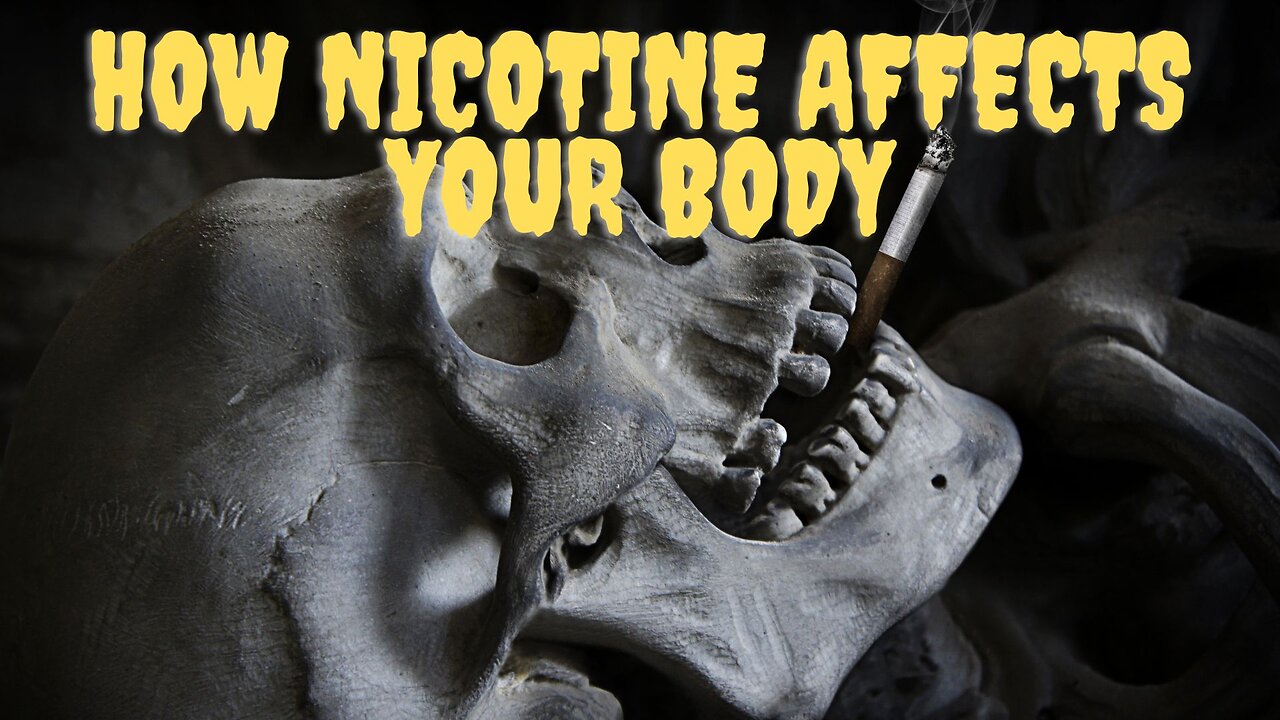Premium Only Content

How Nicotine Affects Your Body
Nicotine is a highly addictive chemical compound found in tobacco products like cigarettes, cigars, and smokeless tobacco. When nicotine is consumed, it rapidly enters the bloodstream and affects various systems and organs in the body. Here's how nicotine affects the body:
Brain: Nicotine binds to nicotinic receptors in the brain, specifically to the acetylcholine receptors. This action stimulates the release of neurotransmitters like dopamine, serotonin, and norepinephrine. This leads to feelings of pleasure, improved mood, increased alertness, and reduced anxiety.
Heart: Nicotine causes the heart rate to increase and blood pressure to rise. This can put additional strain on the heart and cardiovascular system, increasing the risk of heart-related issues, including heart attacks and strokes.
Lungs: Smoking tobacco introduces not only nicotine but also numerous harmful chemicals and toxins into the lungs. The lung tissues can become inflamed, leading to various respiratory issues, reduced lung function, and an increased risk of developing chronic conditions like chronic obstructive pulmonary disease (COPD) and lung cancer.
Blood Vessels: Nicotine narrows the blood vessels, restricting blood flow throughout the body. This can reduce circulation and may lead to an increased risk of developing peripheral artery disease (PAD) and other vascular problems.
Digestive System: Nicotine affects the digestive system by decreasing appetite and potentially slowing down bowel movements. This may contribute to weight loss, but it can also lead to gastrointestinal issues.
Skin: Nicotine can constrict blood vessels in the skin, reducing blood flow and leading to a decrease in skin oxygenation. This can result in premature aging, wrinkles, and a general deterioration of skin health.
Addiction and Withdrawal: Nicotine is highly addictive, and regular use can lead to dependence. When a person stops using nicotine, they can experience withdrawal symptoms such as irritability, anxiety, difficulty concentrating, increased appetite, and intense cravings for nicotine.
Reproductive System: Nicotine can have adverse effects on reproductive health. In pregnant individuals, smoking and nicotine use can harm the fetus and increase the risk of complications like premature birth, low birth weight, and developmental issues.
It's important to note that while nicotine itself is addictive and has health risks, many of the severe health problems associated with tobacco use come from the other harmful substances in tobacco smoke, such as tar, carbon monoxide, and various carcinogens. Therefore, using nicotine replacement therapies (NRT) like nicotine gum or patches may be a safer alternative for those trying to quit smoking. However, it's always best to seek professional advice and support when trying to quit nicotine or tobacco use.
-
 34:26
34:26
CarlCrusher
11 hours agoJake Paul's Crew vs Ancient Skinwalker Canyon
1611 -
 16:07
16:07
Chris From The 740
23 hours ago $0.04 earnedMy BIGGEST Problem with the Ruger RXM – FIXED by Liberty Build Co!
1061 -
 13:29
13:29
Professor Gerdes Explains 🇺🇦
10 hours agoUS Deploys Warships to Venezuela's Coast: A Show of Force Against Putin's Ally
6 -
 12:12
12:12
The Shannon Joy Show
12 hours ago🔥Carcinogens & Fetal Cells In Your New ‘Universal Vaccine’🔥
5422 -
 10:38
10:38
ariellescarcella
10 hours agoOnlyFans Models Fake Being Trans : Queer Activists Are PISSED
86 -
 8:00
8:00
Congressman Eli Crane
15 hours agoThe D.C. Crime Problem | Democrats' Greatest Lies – Vol.2
17.1K9 -
 17:54
17:54
Dr Disrespect
17 hours agoDR DISRESPECT vs VAN DAMME in Hitman 3
72.8K11 -
 2:05:26
2:05:26
Side Scrollers Podcast
19 hours ago4Chan SUES UK Government + Craig Has Mental Illness Fatigue + Knight Rider REBOOT | Side Scrollers
32.4K8 -
 19:26
19:26
GritsGG
1 day agoChat Picked My Hair Color! All Pink Loadout & Operator Challenge!
28.3K4 -
 10:32
10:32
Nikko Ortiz
1 day agoFunniest Fails Of The Month
56.7K8